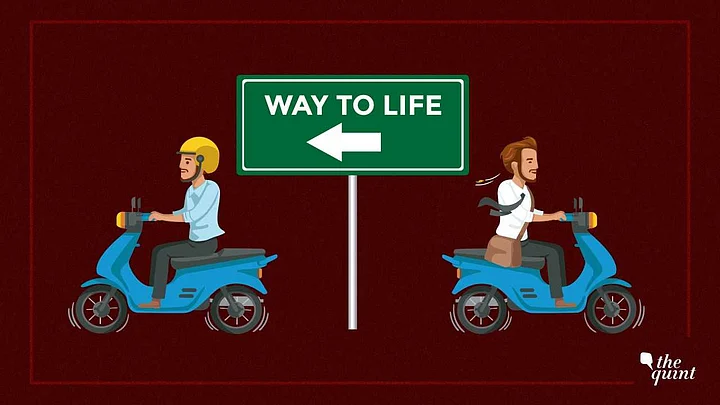The grim news story about the death of a young man in Chandigarh who was a pillion rider when another motorcycle hit their two-wheeler on the day of Holi reminded me of an incident that I was involved in a few weeks before that.
It was around six in the evening on a Friday. Two super speeding motorbikes break the red signal and jam into the front bumper of my car at a busy intersection in south Chennai. I am shaken and fear for the worst. Fortunately, no one is seriously hurt.
Traffic police are always present at this prominent junction and that too in good numbers. The young riders live locally and are well aware of police presence. They have also broken two other laws — neither of them is wearing a helmet nor carrying their original driving license. And in all probability, they did not have vehicle insurance either. Accidents involving motorcyclists have now become common and incidents such as this are a daily occurrence. With the 29th road safety week kicking off on 24 April, let me give you some statistics.
The number of two-wheelers accidents in India rose from 272 per day in 2006 to around 395 in 2015, with the highest number recorded in Tamil Nadu, followed by Madhya Pradesh and Maharashtra.
Too busy to read? Listen to it instead.
These three states accounted for 42 percent of all two-wheeler accidents. About 1 in 4 accidents were fatal, killing nearly 37,000 in 2015. While these numbers seem alarming, there has also been a massive increase in two-wheeler ownership in recent years. In fact, a number of two-wheelers involved in accidents out of the total number of registered two-wheelers has fallen marginally since 2005.
The government has toughened road laws and raised monetary penalties for driving-related offences, and rightly so. This is being supported by numerous road safety nudges.
It is now widely accepted, following the work by behaviourial economists such as Richard Thalier and Cass Sunstein, that human behaviour in a wide range of situations deviate from the assumption of rationality.
The driving behaviour is no exception.
In India police authorities now display electronic messages about fatal consequences of speeding, drunk driving and promote wearing of helmets. We have countdown signals and on national highways we see painted strips in a different texture which are a means of reducing speed before entering an accident prone zone. Globally, in some cities such as Philadelphia, optical speed bump that create an illusion of acceleration by reducing space between the lines on roads have been successfully used.
This kind of nudge approach, however, has limitations. It does not address the central problem with riders’ attitude. We, humans tend to be over overoptimistic about our abilities. A number of studies document that most drivers rate their skills as better than average.
The author of the best-selling book Predictably Irrational, Dan Ariely says that much of drivers’ overconfidence stems from an ‘illusion of control’.
As a result, drivers believe that the probability of an accident is lower than it actually is.
The ‘It Won’t Happen to Us’ Syndrome
An informal survey that I recently ran on Facebook mostly responded by young riders confirms this observation in the Indian context.
When asked to pick from the list of the most likely reasons as to why riders don’t use helmets, the topmost answer was – ‘it won’t happen to me’.
This was followed by the reasons such as helmets mess up hair, are hot, uncomfortable, ugly looking, and restrict vision and mobility. All these other answers, however, have implicitly assumed away any chance of an accident. Only when youngsters feel confident that they would never be involved in an accident they can be more worried about their hair, looks and comfort. The same would be the case for speeding.
Since the riders underestimate the probability of an accident, they do not even think about the risk to life, if an accident indeed occurs. Helping youngsters overcome ‘it won’t happen to me’ syndrome is the key to lower two-wheeler accidents in India. The current approaches to road safety do not incorporate this angle in a systematic manner.
Studies Show Peer Influence Can Reduce Road Fatalities
Peers are primary source of behavioral norms for youngsters and they respond to what is considered ‘cool', and not necessarily what is safe. In an accident that I was involved in, this was clearly evident.
Youngsters will thus, more seriously consider road safety messages if they come from the messenger who they can identify with. Studies in the US show that peer-to-peer education and youth-initiated monitoring used among teens have a positive effect on teen seat belt use.
The peer influence can potentially also be used to tweak police messages on road safety in the Indian cities.
For example, a survey by Montana Department of Transportation in the US showed that people underestimated the extent to which their fellow citizens used seatbelts. Although 85 percent of respondents used a seatbelt, their perception was only 60 percent of other adults did. An intensive social media campaign and a program called ‘Most of Us Wear Seatbelts’ followed and subsequently, the use of seatbelt increased significantly.
Unlike in the financial markets, where only money is at stake, a serious crash due to a misjudged risky riding can result in a loss of life itself or a serious injury. The risk-return tradeoff is much worse than the riders tend to believe. The responsible riding will come from removing the illusion of zero risk and understanding how to make decisions which involve life-threatening risks.
(The author is Professor – Economics & Finance, Great Lakes Institute of Management, Chennai. The views expressed are the author's own. The Quint neither endorses nor is responsible for them.)
(The Quint is now on WhatsApp. To receive handpicked stories on topics you care about, subscribe to our WhatsApp services. Just go to TheQuint.com/WhatsApp and hit send).
